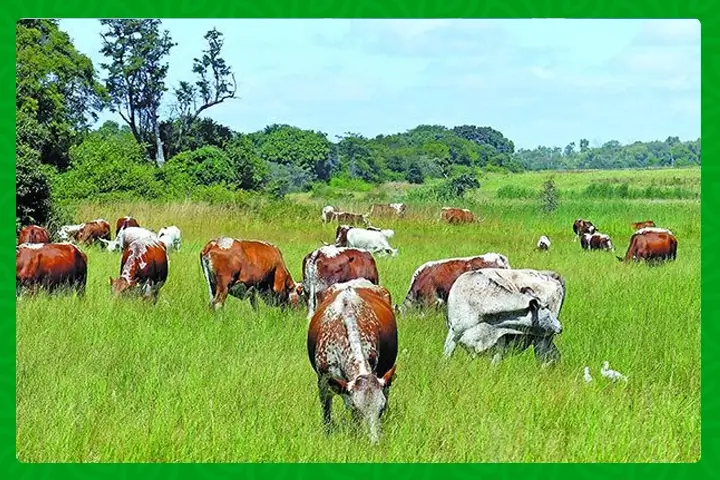
Zimbabwe is home to three indigenous cattle breeds: Nkone, Tuli, and Mashona. Each breed has evolved to thrive in the African environment, becoming efficient beef producers. Among them, the Nkone cattle breed has made a remarkable recovery from the brink of extinction, showcasing resilience and adaptability in the face of challenging circumstances.
The Decline and Resurgence of the Nkone Breed
The past few decades saw a dramatic decline in Nkone cattle numbers, primarily due to land reform and the displacement of commercial farmers. This decline brought the breed close to extinction. However, a concerted effort by Zimbabwean breeders has sparked a revival. “Nkone numbers and breeders declined dramatically, but they are now increasing,” says George Hulme, a prominent Nkone breeder and chairperson of the Nkone Cattle Breeders’ Society of Zimbabwe.
Strategic Efforts for Revival
Hulme attributes the resurgence to ongoing promotional efforts that highlight the Nkone breed’s value as an indigenous cattle breed. These efforts have raised awareness about the breed’s adaptability to harsh conditions and its role in future cattle production in Zimbabwe.
The Nkone, a medium-sized breed, is well-known for its early maturity, outstanding fertility, and remarkable longevity. These traits make it ideally suited for the marginal areas of Zimbabwe, where it can survive and produce under the toughest conditions.
Historical Significance
The Nkone breed’s roots trace back to 1836 when King Mzilikazi of the Ndebele brought these cattle to Zimbabwe. The breed evolved as a distinct ecotype of the original Nguni cattle, adapting to the local environment over nearly 200 years. Despite exposure to other genetics, the Nkone has maintained its core characteristics, becoming a unique breed suited for Zimbabwe’s challenging farming conditions.
Cultural Importance
The Nkone cattle have always been integral to the Ndebele culture. Military regiments were historically distinguished by the colors of their Nkone-hide shields. The breed’s distinctive red-and-white color pattern, called nkone by the Ndebele, remains a point of pride for breeders today.
Commercial and Agricultural Impact
Recognized as a breed in 1946, the Nkone’s commercial herds began to establish primarily in Matabeleland and the Midlands by the 1950s. The Matopos Research Station Stud and the Anglesea Stud, founded with stock from the Tsholotsho herd, are among the oldest registered Nkone herds in the country.
Hulme emphasizes the breed’s potential, stating, “Nkone cattle will form a valuable component of the beef industry and agriculture sector in Zimbabwe. It is imperative to conserve the Nkone breed to ensure its uniquely adapted genetics continue to contribute to the future of the beef industry in Zimbabwe and Southern Africa.”
Economic and Environmental Benefits
The Nkone breed’s ability to thrive in harsh, dry conditions with sparse grazing makes it an economically sustainable choice. The breed excels on all veld and soil types, from drought-prone lowlands to high-rainfall highlands. Nkone cows are highly fertile, producing a good calf every year on veld grazing with minimal inputs. They offer a perfectly adapted mother cow for any breeding system, whether pure breeding, forming composites, or terminal crossing with traditional beef breeds.
Impressive Growth and Performance
The Nkone breed is known for its high meat-to-bone ratio and well-marbled meat. Despite not reaching the final carcass weight desired by some feedlots, the breed’s moderate size ensures high-quality beef production at the lowest cost-per-kilogram per hectare. Statistics show that Nkone calves grow exceptionally well, with average birth weights of 31kg for bulls and 28kg for heifers, and an average 205-day weaning weight of 154kg for bulls and 143kg for heifers.
Looking Ahead
The number of Nkone breeders has increased from two to seven in the past five years, and the number of registered cattle has grown from 150 to about 630. Hulme and his fellow breeders remain committed to breeding and selecting Nkone cattle for functional and economic traits, ensuring the breed’s continued contribution to Zimbabwe’s beef industry.
For more information or to get involved, contact the Nkone Cattle Breeders’ Society of Zimbabwe at tara@umvutcha.co.zw.
Source: Farmers Weekly
Stay updated with the latest farming tips and agriculture industry news from Africa by subscribing to our newsletter. Don’t miss out on valuable insights and updates. Follow us on Twitter, LinkedIn, and Facebook to join our farming community and stay connected with us.



















